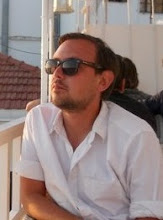This week's column at Thompson on Hollywood:
Developed by Veena Sud from the Danish original, the first season of [The Killing] tracks the investigation of the murder of Rosie Larsen — an investigation led by Det. Sarah Linden (Mireille Enos). Pulled from the brink of retirement by the case, she ducks and weaves through the morass of suspects with her ostensible replacement, rookie Det. Stephen Holder (Joel Kinnaman). The list of potential killers may seem ripped from the headlines — the ex-boyfriend, the teacher, the druggie, the mayoral candidate — but the caustically funny rapport of Linden and Holder is the beating heart of each episode. Enos, her forehead lined and jaw set, plays Linden sharp and doubtful, a reluctant heir to Jane Tennyson of Prime Suspect. She doesn’t down whiskey, screw strangers, and destroy relationships with Jane’s consuming fire, but she’s equally willing to sacrifice her personal life to do her job. Kinnaman, playing her stringy, rangy boy Friday, is the line to her circle — his lackadaisical speech and wary eyes combine to give him a watchful, unembarrassed sex appeal that lends all their exchanges a little frisson of excitement.
You can see by now that The Killing invites comparison. And you will understand my skepticism when it was suggested I watch it alongside Seven, David Fincher’s dystopian thriller about an aging detective (Morgan Freeman) tracking a serial killer (Kevin Spacey), the detective’s newbie partner (Brad Pitt), and the youngster’s wife (Gwyneth Paltrow, in a subtle star turn of quiet pain that ranks among her best). The similarities are powerful: in both, the veteran retiring detective is pulled back into obsessive crime-solving mode when the callow, less reliable new partner is about to take over. My trepidations stemmed from my memory of Seven, which in my mind seemed way off the AMC series’ ken. It was popular among a certain subset of offbeat teens at the time I was in high school, the sort of thing a budding hipster would mention, after Fight Club became a cult hit, to stake his claim on having gotten there first. These memories were clear but not fond — the way you play back an embarrassing moment again and again in your head, waiting for a different ending.
I wait, still. The thickness of the allusive web, lines of Dante and Milton and Shakespeare; the unending terrors of a dying Baltimore; the willingness to build slowly to a point: we are talking here about a director who was always a technical savant, but didn’t quite know at this early stage how to play our strings with heart as well as shock. Watching Fincher’s pitch-black riff on the seven deadly sins now, I am more appreciative of the craftsmanship than ever, because I know he’s learned how to use it — what Seven lacks in precision, he found in Zodiac, what it lacks in cunning, he uncovered in The Social Network.
8.08.2011
Subscribe to:
Post Comments (Atom)


No comments:
Post a Comment